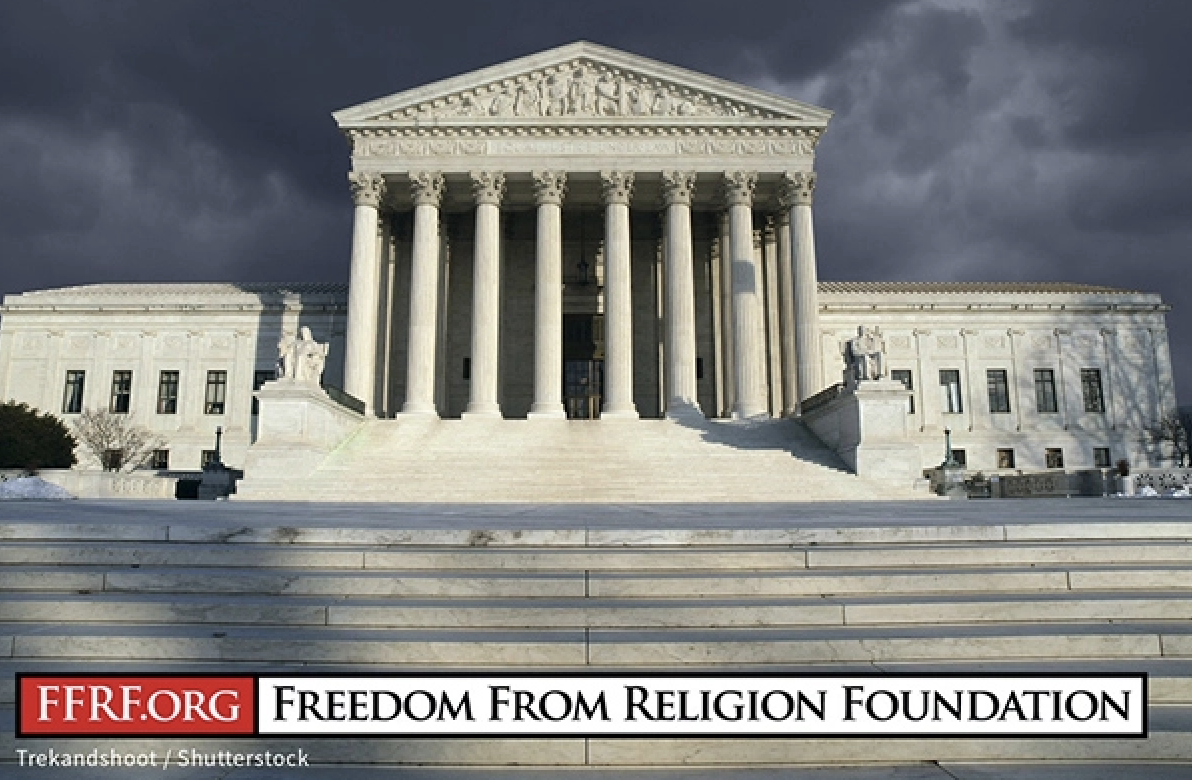
The U.S. Supreme Court held oral arguments today in a case brought by an anti-gay business owner against the state of Colorado — and the signs don’t look too promising.
In 303 Creative v. Elenis, the Supreme Court will decide if a Christian website designer, citing her religious beliefs, must be exempted from Colorado’s Anti-Discrimination Act because she would refuse to provide wedding websites to same-sex couples.
A majority of the justices appear poised to rule in favor of the business owner under an expansive theory of free speech. The Freedom From Religion Foundation is sounding the alarm over the potential fallout from this case.
“Today it appears that the extremist majority on the Supreme Court has signaled its intent to bless discrimination as long as the business owner cites religion as the rationale,” comments FFRF Co-President Annie Laurie Gaylor.
Justice Neil Gorsuch questioned Colorado Solicitor General Eric Olson over the state’s enforcement history and the Supreme Court’s 2018 case involving Masterpiece Cakeshop. After Gorsuch charged that the state put the baker through a “reeducation program,” Olson responded that he “strongly disagreed” with that characterization, saying rather that the baker was familiarized with Colorado law.
Justices Elena Kagan, Ketanji Brown Jackson and Sonia Sotomayor questioned the scope of discrimination that would be permissible. Sotomayor asked, “What about people who don’t believe in interracial marriage, and people who believe that disabled people shouldn’t get married?”
The argument was full of hypotheticals by the justices posed to lawyers from all sides.
Justice Samuel Alito asked in one hypothetical, “If there is a Black Santa at the other end of the mall and he doesn’t want to have his picture taken with a child who is dressed up in a Ku Klux Klan outfit, that Black Santa has to do that?”
Olson responded, “No, because Ku Klux Klan outfits are not protected characteristics under public accommodations laws.” Justice Elena Kagan chimed in, “And presumably that would be the same Ku Klux Klan outfit regardless of whether the child was Black or white or any other characteristic.” Alito joked, “You do see a lot of Black children in Ku Klux Klan outfits, right? All the time.”
These inappropriate and contrived hypotheticals by Alito and some other justices underscore a major problem with the case, charges FFRF.
“The Supreme Court never should have taken this manufactured case, and the argument today underscores that this case is detached from reality,” says FFRF Senior Counsel Patrick Elliott.
FFRF filed a friend-of-the-court brief in the case earlier this year, which argued that the challenge was manufactured from the outset. The brief argues that the wannabe wedding website designer is seeking to sidestep the Constitution’s “case or controversy” requirement because she has never actually designed wedding websites and therefore has never been subject to a complaint under the Colorado Anti-Discrimination Act.
“Lorie Smith may dislike that loving same-sex couples in the United States are afforded the right to marry,” states the brief. “Her religious disagreement with marriage equality, however, does not magically transform a speculative chain of events into an imminent injury.”
FFRF warns that the decision is likely to go much further beyond the Masterpiece Cakeshop decision and inflict lasting damage. Judges have largely viewed the Masterpiece Cakeshop case, which had as its focus claimed “hostility” to religion by the Colorado Civil Rights Commission, as a narrow decision.
In the case before the court, businesses may be permitted to broadly assert the right to discriminate as a matter of free speech against any number of protected classes, especially on the basis of sexual orientation and gender identity.
The Freedom From Religion Foundation is the largest national association of freethinkers, representing atheists, agnostics, and others who form their opinions about religion based on reason, rather than faith, tradition or authority. It has more than 38,000 members across every state and the District of Columbia and several chapters all over the country, including 1,200 active members in Colorado and chapters in Denver and Colorado Springs. More than 10 percent of FFRF’s members identify as LGBTQ. FFRF supports civil rights protections for LGBTQ Americans and opposes the radical redefinition of “religious freedom” as the right to impose one’s religious beliefs on others.

